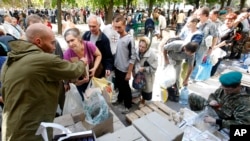The U.N. food agency said Tuesday that it would stop providing food aid to conflict-affected people in the eastern part of Ukraine at the end of February because of a lack of funding, despite a rising number of people going hungry.
A World Food Program (WFP) spokesman said in a statement to the Thomson Reuters Foundation that dwindling resources had made it increasingly difficult for the agency to maintain its operations in Ukraine.
"WFP's operation to provide food assistance to vulnerable, conflict-affected people in the eastern part of Ukraine will continue for another two months of the winter and will then come to an end," the spokesman said.
The spokesman added WFP would keep a limited presence there at least until mid-2018 and continue to monitor the situation.
The move came as fighting between government forces and pro-Russian separatists in the east approaches its fourth winter and 1.2 million Ukrainians struggled to put food on the table this year, up from 620,000 in 2016, according to U.N. figures.
"Food insecure people ... essentially doubled in the past year and WFP has no funding to continue its operations," the U.N.'s top representative in the country, Neal Walker, told the Thomson Reuters Foundation in an interview Tuesday.
Battles' toll
More than 10,000 people, including 2,500 civilians, have been killed since violence broke out in 2014, and 1.6 million have been forced to flee their homes.
The conflict has affected almost one in 10 Ukrainians, leaving more than 3 million people in need of humanitarian assistance.
Last year the U.N. asked for about $200 million to address the crisis — a "drop in the bucket" compared with the $22.2 billion global humanitarian appeal, Walker said.
Yet, so far it has received less than 30 percent of the money, Walker said.
"For us to be getting so little relative to this crisis is affecting our capacity," he said.
On Monday the U.N. launched its 2018 humanitarian appeal for Ukraine, asking for $187 million to help 2.3 million people hit by the conflict.
"While Ukraine may no longer be front page news, people continue to need our help," Walker said.





